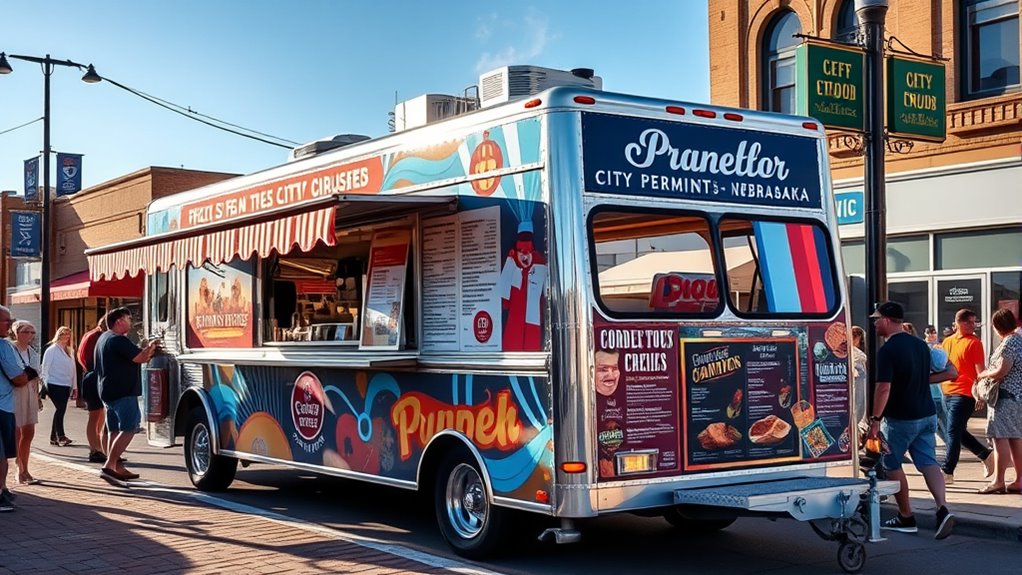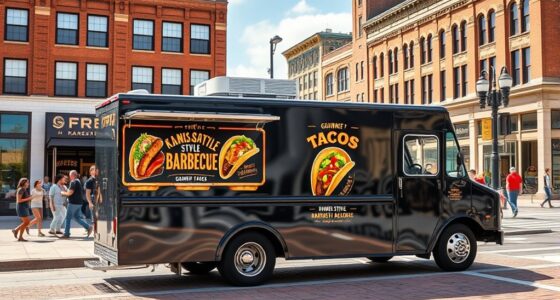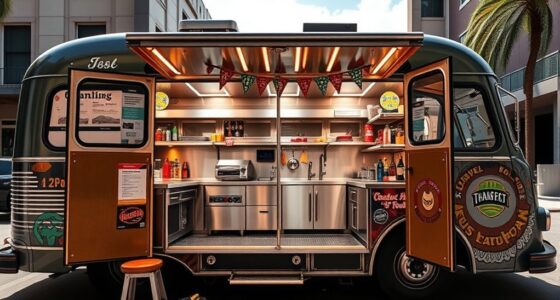To open a food truck in Grand Island, Nebraska, you’ll need to secure permits from the Nebraska Department of Agriculture, guarantee compliance with local zoning, and get city or event-specific licenses, costing around $79 plus annual fees. Choose locations in commercial zones or work at private events, and follow Nebraska food safety standards for your menu. To succeed, focus on marketing through social media and community events—more tips wait as you explore further.
Key Takeaways
- Obtain necessary permits from Nebraska Department of Agriculture and local health departments, including annual inspection fees and documentation.
- Budget startup costs between $41,500 and over $120,000 for truck purchase, supplies, and marketing, plus ongoing expenses.
- Focus on commercial or mixed-use zones, secure private property or event permits, and utilize location analysis tools for optimal spots.
- Develop a unique menu adhering to food safety standards, build a strong brand, and leverage social media and community events for marketing.
- Consider legislation like LB 740 for a statewide permit system to reduce compliance costs and streamline multi-city operations.
Understanding Permitting Requirements and Necessary Documentation
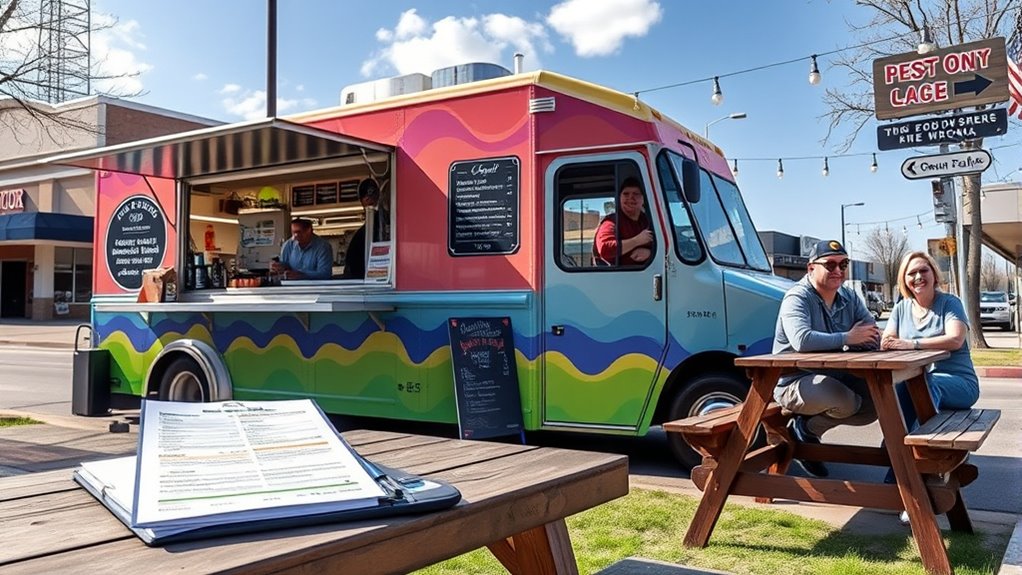
To operate a food truck in Grand Island, Nebraska, you need to understand the permitting process and the documentation required. First, you must obtain a permit from the Nebraska Department of Agriculture’s Food Safety and Consumer Protection (FSCP), unless you’re only operating at one event per year for no more than two days. This permit requires compliance with the Nebraska Food Code and an inspection, which you can request through FSCP staff. The permit costs around $79.23, with an annual inspection fee of about $39.60 due each August 1. Each mobile food unit needs its own valid permit displayed during operation. Additionally, you’ll need a Food Vendor Permit from the Central District Health Department and a city vendor permit from Grand Island, both processed through local authorities. Proper documentation, including inspection reports, permit copies, and commissary agreements, is essential for compliance. Understanding mobile food unit regulations can help ensure adherence to all safety and operational standards.
Breakdown of Costs and Fees for Operating a Food Truck
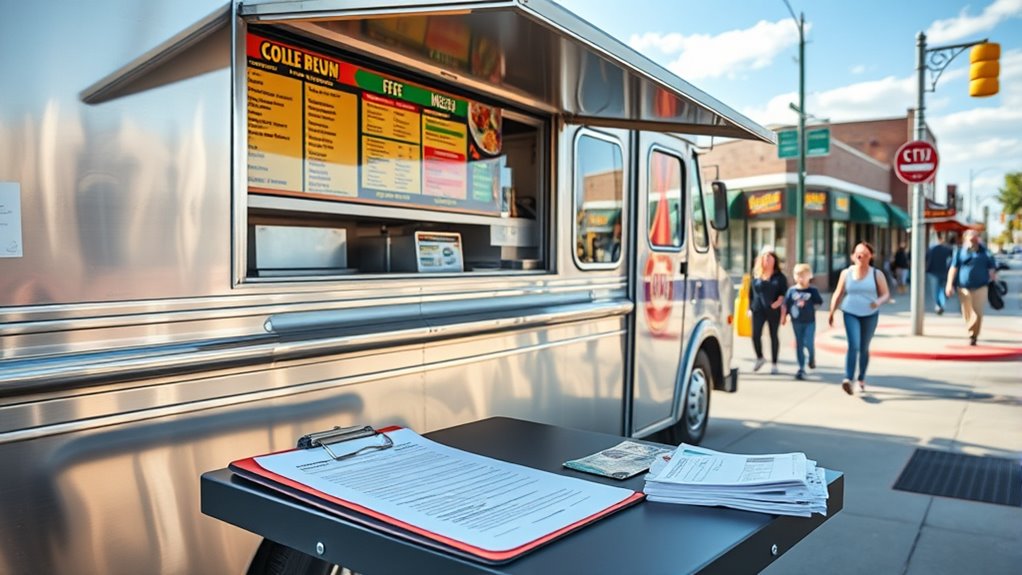
Understanding the costs involved in running a food truck is essential to your success. From permits and licensing fees to ongoing operational expenses, these costs add up quickly. Let’s break down what you need to budget for to keep your food truck business running smoothly in Grand Island. Startup costs for purchasing or leasing your truck, including licensing, supplies, and marketing, typically range from $41,500 to over $120,000. Additionally, ongoing expenses such as insurance, maintenance, and event permits will require careful planning to ensure profitability. Being aware of food truck regulations and compliance requirements can help you avoid unexpected costs and legal issues.
Permitting Expenses Overview
Operating a food truck in Grand Island requires maneuvering various permits and fees that can greatly impact your startup and ongoing costs. You’ll need to budget for multiple expenses, including state, local, and event permits. The Nebraska Department of Agriculture charges an annual permit fee of about $79–$86, plus inspection fees around $39–$43 each year. At the local level, you must obtain a food vendor permit from the Central District Health Department and display it prominently. All food vendors must apply for a permit before selling food or drinks, ensuring compliance with health and safety standards. Additional costs include nonrefundable application fees for vendor badges through the police department, commissary fees ranging from $86–$120 annually, and event permits costing $50–$200 per event. Keep in mind, permit fees may change annually and vary depending on your specific operation.
Operational Fee Structures
Managing the costs involved in running a food truck in Grand Island means breaking down both fixed and variable expenses that impact your bottom line. Fixed costs include permits, insurance, and commissary fees, while variable costs cover fuel, maintenance, waste disposal, and inventory. Here’s a breakdown:
| Expense Category | Estimated Annual Cost | Notes |
|---|---|---|
| Vehicle Maintenance | $500–$1,200 | Oil changes, repairs |
| Fuel | $500–$1,000 | Varies with travel and hours |
| Insurance | $2,000–$4,000 | Liability, vehicle coverage |
| Permits & Fees | $600–$1,200 | State, county, city, inspections |
Understanding these fees helps you budget effectively and ensure smooth operations. Accurate expense tracking is essential for maintaining profitability and planning for future growth.
Choosing Permissible Locations and Operational Zones

Choosing the right locations for your food truck in Grand Island is crucial to guarantee compliance with legal boundaries and ensure smooth operations. You need to focus on zones allowed by city zoning codes, mainly commercial or mixed-use areas. Operating in residential zones typically isn’t permitted unless you secure special event permits. Public street or alley spots require specific permissions or permits, while private property use often needs owner consent. Temporary spots at events can be exempt but also require event-related permits. Always consult the Grand Island City Code and Planning Department to identify acceptable zones and restrictions. Remember, obtaining the necessary permits and permissions for each location ensures you stay compliant and avoid disruptions. Proper location selection is key to a successful food truck business. Incorporating AI-powered location analytics can help identify optimal spots based on foot traffic and demographic data.
Food Safety Standards and Menu Regulations in Nebraska
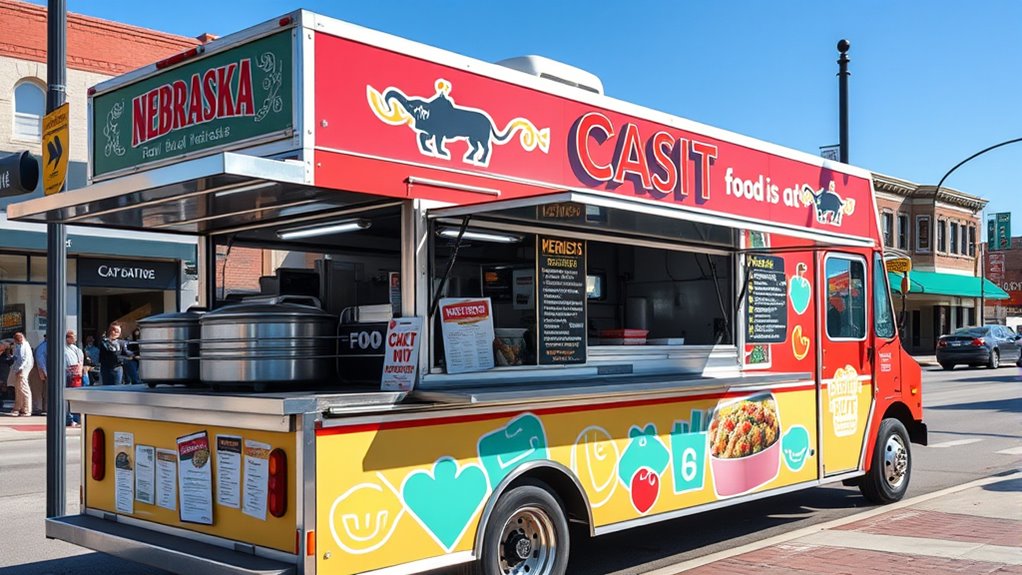
Ensuring your food truck meets Nebraska’s food safety standards is essential for legal operation and customer safety. You must comply with the Nebraska Food Code, which mandates durable, nonabsorbent, and easy-to-clean materials for construction. Food prep areas should be separated from driving zones to prevent contamination. Trucks must be fully enclosed with pest-proof doors and windows, and floors, walls, and ceilings need to be smooth and crack-free. Proper wall organization can help maintain cleanliness and safety standards within your truck.
Effective Marketing Strategies and Building a Customer Base
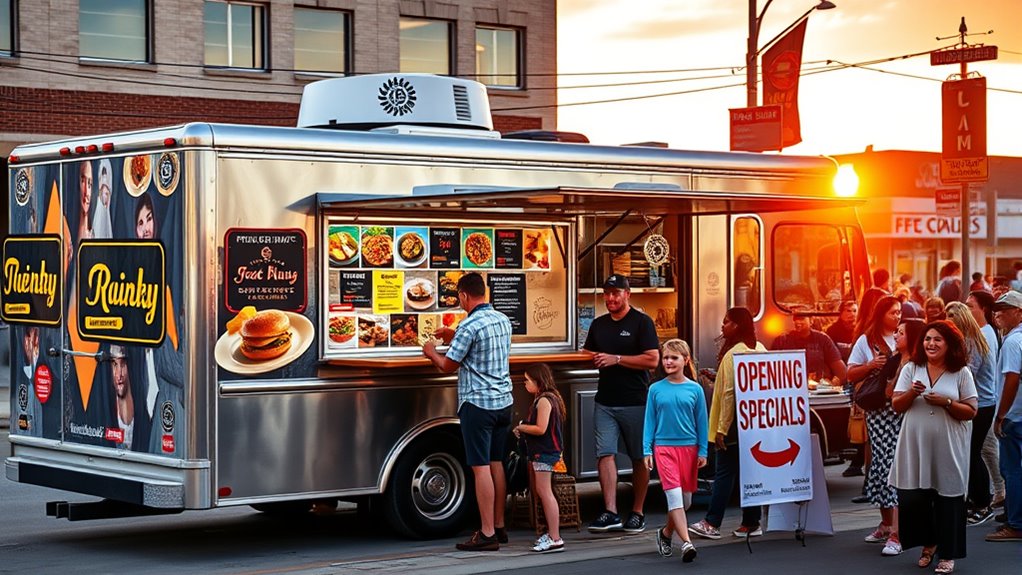
To build a strong customer base for your food truck, leveraging effective marketing strategies is essential. Social media is a powerful tool—68% of food trucks use platforms like Facebook, which drives a 15% increase in customer spend per visit. Mobile apps specific to food trucks saw a 35% rise in downloads, helping customers find you easily. Participating in local festivals and community events boosts visibility and builds loyalty. You should also implement customer loyalty programs—over half of food trucks do, increasing repeat visits by 30%. Email marketing keeps your customers engaged with promotions and updates, while eye-catching branding and creative menus attract attention. Integrating data analytics and GPS technology to optimize marketing efforts and improve customer experience can provide valuable insights. Community engagement strategies continue to make food trucks a lucrative and competitive business opportunity, so staying current with digital tools and community engagement strategies will give you an edge.
Navigating Industry Challenges and Regulatory Trends
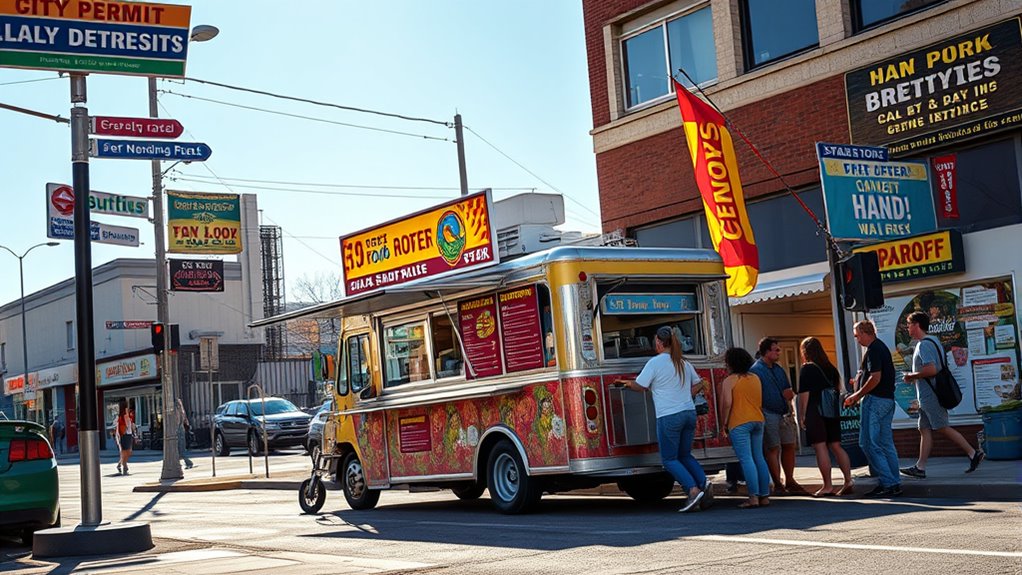
Operating a food truck in Grand Island involves maneuvering a complex web of regulations and permit requirements that can challenge even seasoned vendors. You’ll need multiple permits: a state permit costing around $79.23 plus an inspection fee of $39.60, plus local vendor permits from the Central District Health Department, which vary in cost. You must carry permits on your truck and comply with Nebraska’s Pure Food Act and local health rules. Employees need police-issued ID badges worn during operation. City permits can be limited to single visits, increasing costs for frequent operations. Industry reforms, like the proposed LB 740, aim to simplify this with a statewide, reciprocal permit system. Staying compliant requires attention to health regulations and permits, but current fragmentation can limit flexibility and increase expenses. The legislation would also establish a single inspection permit valid across all participating municipalities], reducing the need for multiple inspections and streamlining compliance.
Tips for Successfully Launching Your Food Truck Business
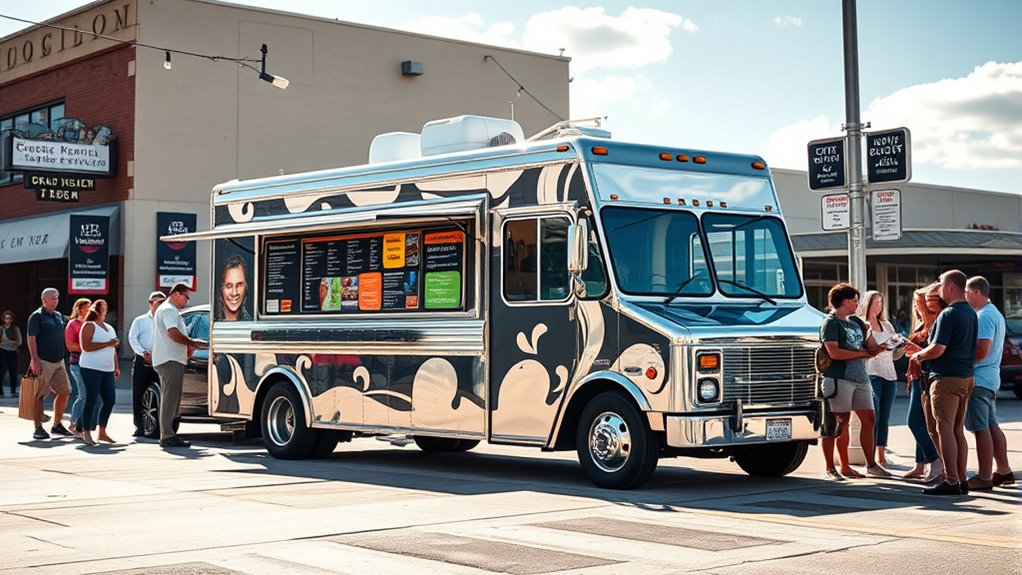
Launching a successful food truck in Grand Island starts with developing a unique and consistent concept that sets you apart from the competition. Focus on creating a strong brand identity by maintaining consistent colors, logos, and design elements. Choose a food concept that stands out and resonates with local tastes, while regularly refining it to stay relevant. Use word-of-mouth marketing by encouraging satisfied customers to recommend you, as 90% trust peer suggestions. Additionally, understanding local market trends and demographics can help tailor your offerings to meet customer preferences effectively market insights.- Identify and exploit market gaps through thorough research – Streamline your menu to boost efficiency and profitability – Expand sales channels via online ordering and event participation – Build customer loyalty with engaging social media and loyalty programs Staying adaptable and customer-focused is key to long-term success.
Frequently Asked Questions
How Long Does the Permit Approval Process Typically Take in Grand Island?
The permit approval process in Grand Island typically takes around 3 to 7 business days once you submit a complete application. You need to account for background checks, health department permits, and possibly inspections, which can add extra time. To avoid delays, guarantee all your paperwork, fees, and supporting documents are accurate and submitted promptly. Planning ahead helps you stay within the usual timeline and get your permit quickly.
Are There Specific Vehicle Requirements for Food Trucks Operating in Nebraska?
Think of your food truck as a traveling star on Nebraska’s culinary sky. You need to meet specific vehicle requirements before you shine. Your truck must be motorized or portable, with dimensions and equipment adhering to local zoning and safety standards. If you’re cooking with smoke or grease, extra inspections and safety measures are essential. Keep your vehicle in top shape, compliant, and ready to roll—Nebraska’s rules guarantee your star shines safely and brightly.
Can I Operate My Food Truck Without a Commissary in Grand Island?
You’re wondering if you can operate your food truck without a commissary in Grand Island. While the city’s health department doesn’t explicitly necessitate a commissary, you’ll need to meet food safety standards. This might mean using an approved certified kitchen or possibly on-truck prep if permitted. To avoid surprises, contact the Central District Health Department directly to confirm their specific requirements and ensure your setup complies with local regulations.
What Are the Penalties for Operating Without Proper Permits in Nebraska?
You might think operating without permits is a free ride, but Nebraska’s laws say otherwise. If you skip the paperwork, expect hefty fines—like $60 or even $250 per violation—and possible license suspension. Authorities actively enforce these rules through inspections and warnings. So, what seems like a shortcut actually leads to costly penalties, legal trouble, and the risk of permanently losing your chance to serve delicious food on the streets.
Are There Restrictions on Menu Items or Ingredients for Food Trucks in Grand Island?
You might wonder if Grand Island restricts your menu or ingredients. The truth is, local rules don’t specify prohibited foods or ingredients for food trucks. You’re free to design your menu as long as you follow general food safety standards, like proper handling and storage. Just make sure you obtain the necessary permits and pass inspections, but your choice of cuisine or ingredients remains mostly unrestricted by local ordinances.
Conclusion
Starting your food truck in Grand Island might seem overwhelming at first, but with the right planning, it’s totally doable. Don’t let permits or costs hold you back—focus on creating a unique menu and connecting with your community. Remember, challenges are part of the journey, and each step brings you closer to success. Enjoy the process, stay flexible, and soon you’ll be serving up your favorite dishes to happy customers!
